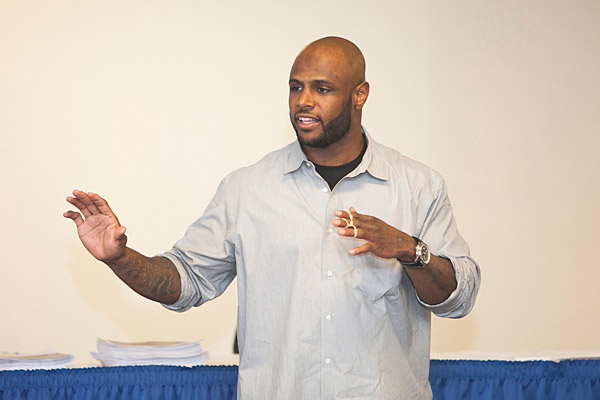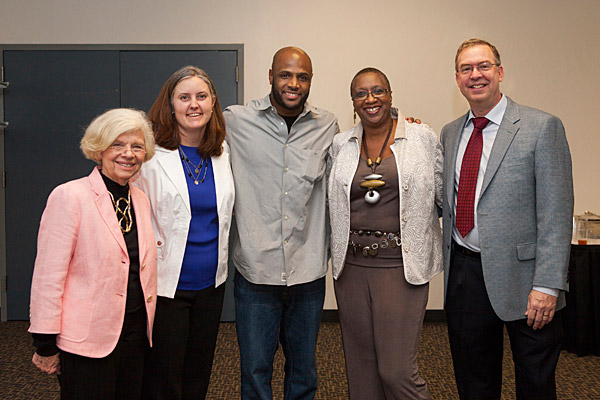


Bronco bucks poverty
National Football League player Adams credits UD with success
12 p.m., April 26, 2012--When Mike (Pops) Adams stepped onto the University of Delaware campus as a freshman in 1999, he knew things would be different. Adams had grown up in Paterson, N.J., one of seven children in a three-bedroom apartment. Drug dealers were everywhere and the likelihood of going to jail or being shot was high.
On April 19, Adams, a National Football League veteran of nine years and a leader on the Blue Hens' 2003 national championship team, spoke at UD, explaining, “I didn’t expect the culture shock to be so extreme. But honestly, the only white people we ever saw in my neighborhood were landlords or people coming to buy drugs.”
People Stories
'Resilience Engineering'
Reviresco June run
During his symposium, entitled “Reaching Back, While Moving Forward,” Adams told the audience at the Perkins Student Center how he was able to parlay his skills on the football field into a better life.
“Going to college had never been a consideration. Fortunately, I earned a football scholarship and decided to come to UD. Once I got here, I knew I wanted to graduate.” But it wasn’t easy, Adams admitted. He struggled with paralyzing doubt. Did he really belong here? How could he fit in? What should he major in?
As a sophomore, his adviser, Kristine Ritz Coll, encouraged him to take classes in human development and family studies. He found they really clicked for him and he became a human services major.
It was through these classes that he developed relationships with faculty, including Mary Lou Liprie, professor emerita, who stayed in touch and was instrumental in bringing Adams back to campus to speak.
“My friends and family back home were doing drugs, going to jail, getting pregnant at 13. It was bad. I knew I wanted to help. I wanted to have an impact. This major gave me a sense of purpose,” explained Adams.
Ritz Coll couldn’t have been happier for him. “For the next four years, I came to know Mike as a terrific young man. He had a way with everyone on campus. He was so concerned about others and so appreciative of anything anyone was able to do for him,” she said.
Whether providing a hug or a much needed talking-to, Adams’ CEHD faculty and advisers were always there to give him the support he needed to succeed.
“My mentor (Norma Gaines-Hanks, associate professor of human development and family studies) may not know this, but I almost didn’t go to graduation. My mom had had been diagnosed with cancer only a few months earlier and died the day before. I didn’t think I could face it, but Dr. G gave me a hug, just because she was so proud of me. That got me through,” Adams said.
Not only did he face obstacles in his personal and academic life, his football career provided challenges as well. Adams sustained a hip injury his senior year that his doctor said was career-ending. Not ready to give up that easily, he managed to fight back, only to break his leg the following year, as a redshirt senior.
He was able to recover once again and was on UD’s NCAA Division I-AA national championship team in 2003. It was also the year he made Dean’s List. That spring, he graduated with a bachelor of science in humans services, education and public policy.
“Not only was I the first person in my family to graduate college, I was only the second to graduate high school,” Adams said, “and I couldn’t have done it without all the support I received at UD.”
After graduation, Adams was signed by the San Francisco 49ers, where he played for three years. He then went to the Cleveland Browns for five years and became a Denver Bronco in March.
Through it all, Adams never forgot where he came from. He continues to dedicate his time and money to help the less fortunate. In addition to supporting charities through the NFL, he started a foundation called Rising Stars with his childhood friend Gerald Hayes, linebacker for the Arizona Cardinals.
“Rising Stars supports the kids back home in Paterson," Adams said. "We want to help them overcome the negativity in the streets. We help them build self esteem through football camps and mentoring, we provide backpacks full of school supplies and offer scholarships for post-secondary education.”
His ultimate goal is to start a charter school “Not tomorrow … not soon, but someday. That’s my plan.” If past performance is any indication, it appears nothing will stop him from succeeding.
For more information on Adams' foundation, visit Rising Stars website.
Article by Alison Burris
Photos by Ambre Alexander









